International activity of the Department of Ukrainian Studies, Cultural Studies and History of Science.
Today, the department’s faculty members are actively involved in international projects, are recipients of international research grants, and regularly present research results at international conferences, forums, symposia, seminars, and are invited lecturers.
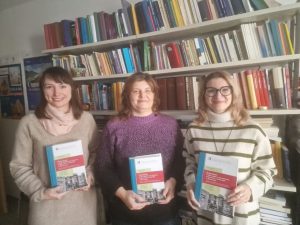
In 2022-2023, Associate Professors Yevheniia Shyshkina and Svitlana Telukha took part in a project to collect video and audio interviews with Ukrainian refugees in Germany. As a result, 100 oral histories were collected and a monograph “Unsagbar: Erlebensgeschichten ukrainischer Frauen über die russische Invasion und Flucht nach Deutschland”. A series of presentations of the monograph were held, including: On February 8, 2024, the associate professors spoke at a seminar organized by the “Prizma Ukraine: War, Migration, Memory. Research Network Eastern Europe”, Berlin; on February 29, 2024, Associate Professor Yevheniia Shyshkina, Associate Professor Svitlana Telukha presented the book for a series of online seminars of the Ukrainian Oral History Association ”Field. Risks. War”
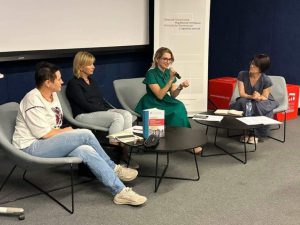
On August 26-27, 2024, in Wroclaw, during the workshop “(Not) Far from the War: The Russo-Ukrainian War in Refugees’ Testimonies, Oral Histories and Diaries”, the sixth seminar organized by the Ukrainian-German Commission was held, where Associate Professor Svitlana Telukha also presented this monograph and shared her experience of conducting oral history research during Russia’s full-scale war against Ukraine.
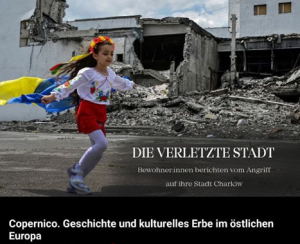 In February 2024, thanks to the work of Associate Professor Svitlana Telukha and PhD student Yevhen Telukha, the international German-Ukrainian project “Kharkiv – Wounded City” was launched on the Copernico portal, a research organization working in the field of cultural heritage communication and education, presenting information about common history and shared cultural heritage in Eastern Europe in an attractive and scientifically sound way. The project presents the stories and experiences of Kharkiv residents who did not leave Kharkiv after Russia’s full-scale invasion of Ukraine. The project has video content supplemented by teasers for interviews, research articles about the history of Kharkiv, the peculiarities of conducting oral history research during the war, and the sites themselves and historical information about the favorite places of memory of Kharkiv residents.
In February 2024, thanks to the work of Associate Professor Svitlana Telukha and PhD student Yevhen Telukha, the international German-Ukrainian project “Kharkiv – Wounded City” was launched on the Copernico portal, a research organization working in the field of cultural heritage communication and education, presenting information about common history and shared cultural heritage in Eastern Europe in an attractive and scientifically sound way. The project presents the stories and experiences of Kharkiv residents who did not leave Kharkiv after Russia’s full-scale invasion of Ukraine. The project has video content supplemented by teasers for interviews, research articles about the history of Kharkiv, the peculiarities of conducting oral history research during the war, and the sites themselves and historical information about the favorite places of memory of Kharkiv residents.
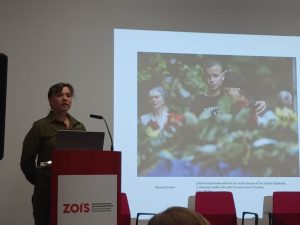 Associate Professor Olha Haidamachuk is currently a participant in the international research project “ Prizma Ukraine: War, Migration, Memory” at the Forum for Transregional Studies: 2022 in Berlin. Within the framework of this project, during 2024, Associate Professor Olha Haidamachuk is a Gerda Henkel Foundation scholar and participant in various initiatives, including: international networking “Ukrainian Researchers in Germany: Networking and Cooperation Event 2024” on April 17-18, 2024 at the DBB Forum in Berlin; participation in the international conference ‘The 3rd Annual Meth@Mig Workshop Participant Recruitment Strategies and Sampling Methods in Migration Research’ on April 25-26 (Leibniz Institute for the Social Sciences in Mannheim (Germany) with the report ‘The Tonality of the Forcibly Displaced Ukrainians’ Memory: The Analysis of the Methodology”. On August 12-24, 2024, Associate Professor Olha Haidamachuk participated in the Ukrainikum Summer School in Greifswald (Germany).
Associate Professor Olha Haidamachuk is currently a participant in the international research project “ Prizma Ukraine: War, Migration, Memory” at the Forum for Transregional Studies: 2022 in Berlin. Within the framework of this project, during 2024, Associate Professor Olha Haidamachuk is a Gerda Henkel Foundation scholar and participant in various initiatives, including: international networking “Ukrainian Researchers in Germany: Networking and Cooperation Event 2024” on April 17-18, 2024 at the DBB Forum in Berlin; participation in the international conference ‘The 3rd Annual Meth@Mig Workshop Participant Recruitment Strategies and Sampling Methods in Migration Research’ on April 25-26 (Leibniz Institute for the Social Sciences in Mannheim (Germany) with the report ‘The Tonality of the Forcibly Displaced Ukrainians’ Memory: The Analysis of the Methodology”. On August 12-24, 2024, Associate Professor Olha Haidamachuk participated in the Ukrainikum Summer School in Greifswald (Germany).
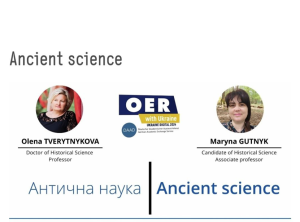 Professor Olena Tveritnikova, Associate Professor Maryna Hutnyk and PhD student Khikhlo V. are participants in the DAAD scholarship project “Ukraine digital: Ensuring academic success in times of crisis” in the project of Leibniz University Hannover ‘Open Educational Resources with Ukraine’ (2022, 2024). As part of the project, 8 video lectures on the course “History of Science and Technology” were prepared, which presented the development of knowledge in ancient Egypt and Mesopotamia, analyzed the stages of ancient science and technology of the Middle Ages, considered urbanization of cities and the electric tram, research in physics in Kharkiv, and innovations in electrical science. Project materials could be founded via link.
Professor Olena Tveritnikova, Associate Professor Maryna Hutnyk and PhD student Khikhlo V. are participants in the DAAD scholarship project “Ukraine digital: Ensuring academic success in times of crisis” in the project of Leibniz University Hannover ‘Open Educational Resources with Ukraine’ (2022, 2024). As part of the project, 8 video lectures on the course “History of Science and Technology” were prepared, which presented the development of knowledge in ancient Egypt and Mesopotamia, analyzed the stages of ancient science and technology of the Middle Ages, considered urbanization of cities and the electric tram, research in physics in Kharkiv, and innovations in electrical science. Project materials could be founded via link.
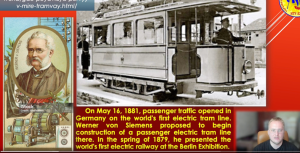
In October 2023-February 2024, Associate Professor Ihor Dvorkin participated in the Sustaining Ukrainian Scholarship program with the project “Memory of the Second World War in Modern Ukraine”. During these 5 months, he conducted his research (remotely) at the Center for Advanced Study (Sofia, Bulgaria). I. Dvorkin presented the results of his work at an online seminar and prepared an article based on the results of the internship.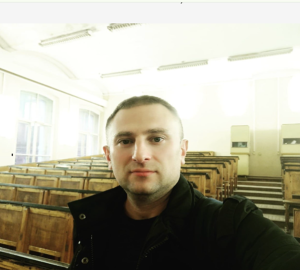
On December 12, 2023, Associate Professor Dvorkin Ihor held online webinars at the Center for the Study of the Holocaust, Genocide and Crimes Against Humanity and the British Association of Slavic and East European Studies https://basees.org/events/2023/12/13/basees-talk-the-second-world-war-in-contemporary-ukrainian-discourse
On May 29, 2024, Associate Professor Yevheniia Shyshkina made a presentation “From Internationalism to Imperial Nationalism: The “Russian World” in the Russian-Ukrainian Information War of 2014-2022”, which was supported by the Leibniz ScienceCampus ‘Eastern Europe – Global Area’ and the University of Leipzig.
On May 1-3, 2023, Associate Professor Yevheniia Shyshkina made a presentation “Digital Visual Aggression as a Means of Political Communication of the XXI Century” at the conference “A Brief History of Digital Publics in War” in Berlin, initiated by FernUniversität in Hagen.
On November 9-11, 2023, Associate Professor Yevheniia Shyshkina took part in the conference: “New Configurations of History, Memory and the Present in Belarusian and Neighboring Societies”, held in Berlin at the initiative of FernUniversität Hagen, University of Bremen, Washington University in St. Louis.
On September 14-15, 2022, Associate Professor Yevheniia Shyshkina took part in the workshop “Sites of Memory and Competing Cultures of Memory”, organized by Moldova-Institut Leipzig e.V. and delivered a presentation “The Koryukiv Tragedy of 1943 in the Historical Memory of World War II.
On July 18-20, 2024, Associate Professor Svitlana Telukha took part in the “Eighth Annual Conference of the Memory Studies Association (MSA)” Association for the Study of Memory. The theme of the 2024 conference was “Memories in Transit” (Lima, Peru) and she presented a report “Tools and Representations in the Contemporary Memory of the Holocaust in Ukraine (on the Example of Kharkiv).” 
On May 3, 2024, Associate Professor Svitlana Telukha visited the Neuengamme Concentration Camp Memorial (Germany), where a commemorative event was held to mark the anniversary of the liberation of the camp. Four prisoners of the concentration camp – Dita Kraus, Livia Frankel, Barbara Piotrowska, and Helga Melmed – attended the event with their relatives.
Svitlana Telukha recorded interviews with relatives of Neuengamme prisoners from Ukraine and met with the Consul General of Ukraine in Hamburg (Germany).
At the Philipp Schwartz and Inspireurope 2024 Stakeholder Forum on April 18-19, Svitlana Telukha took the opportunity to discuss academic freedom and support for researchers at risk in Europe.
On April 20, 2024, Associate Professor Svitlana Telukha took part in the networking meeting “Ukrainian Researchers in Germany: Networking and Cooperation Event 2024”, where topics related to the current situation in higher education and research in Ukraine, establishing communication between scientists were discussed.
On the occasion of the second anniversary of the beginning of the large-scale Russian invasion of Ukraine on 24.02.2024, Associate Professor Svitlana Telukha presented her research and gave a lecture on the experiences of those who were forced to leave Ukraine at the City Hall of Leipzig (Germany). The program was organized by the Ukrainian cultural initiative Dozwillia Leipzig and Leipzig helps Ukraine with the support of the Leipzig-Kyiv City Partnership and with the greetings of the Mayor of Leipzig Burkhard Jung.
On February 19-20, 2024, Associate Professor Svitlana Telukha took part in a winter institute hosted by the Holocaust Educational Foundation of Northwestern, University of Texas (Austin, USA), during which participants from around the world presented research and best practices in working with the Holocaust in the student audience.
On October 9, 2023, Associate Professor Svitlana Telukha met with the Minister of Education and Science of Ukraine Oksen Lisovyi at the Alexander von Humboldt Foundation networking meeting in Berlin.
The department continues to cooperate with the organizations “Science at Risk” and University New Europe in mentoring and partnership to build international cooperation and create conditions that facilitate the integration of university graduates and postgraduate students of the department into the European scientific community. Today, the University has established ties with the University of Leipzig (Germany) and is negotiating a partnership in academic mobility programs.
